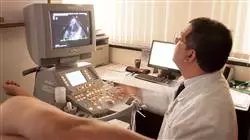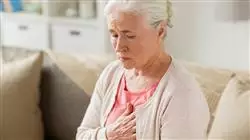University certificate
The world's largest faculty of medicine”
Introduction to the Program
This training will generate a sense of confidence in the performance of medical practice, which will help you grow both personally and professionally"

Cancer patients often present pathologies associated with the oncological process that require care. On the other hand, approaches to cancer patients are often aggressive and can affect other systems, which in the case of frail patients is a major problem in managing risk in therapeutic choices.
The heart is undoubtedly one of the organs most affected by systemic cancer treatments, and considering the importance of its functioning, it becomes an area of study that requires rigor, depth and timeliness.
Cardiological effects are routinely present in the side effects of most treatments for the oncology patient. The management of the medication, as well as of other therapeutic options, is fundamental in the adjustment of the appropriate dosage for medical praxis. Being up to date on the details of cardiac risk management in this type of patient is a fundamental skill for the physician to possess when dealing with the patient and his or her symptoms.
This program is designed to facilitate the specialist's updating process, so that he/she can include in the clinical practice of their patients all the innovations and the latest knowledge about oncological therapeutics.
Update your knowledge with the Postgraduate diploma program in Cardiotoxicity, Mechanisms and Early Detection"
The Postgraduate diploma in Cardiotoxicity, Mechanisms and Early Detection contains the most complete and up to date scientific program on the market. The most important features of the program include:
- Development of case studies presented by experts in Cardiotoxicity, Mechanisms and Early Detection. The graphic, schematic, and eminently practical contents with which they are created provide scientific and practical information on the disciplines that are essential for professional practice
- Developments on the cardiotoxic effect of oncologic therapies and cardiac risk assessment
- It contains practical exercises where the self-evaluation process can be carried out to improve learning
- With special emphasis on innovative methodologies in therapeutic risk assessment
- All of this will be complemented by theoretical lessons, questions to the expert, debate forums on controversial topics, and individual reflection assignments
- Content that is accessible from any fixed or portable device with an Internet connection
This Postgraduate diploma may be the best investment you can make in the selection of a refresher program for two reasons: in addition to updating your knowledge in Cardiotoxicity, Mechanisms and Early Detection, you will obtain an Postgraduate diploma certificate from TECH Global University"
Its teaching staff includes professionals in the field of cardiotoxic effects of oncological therapies and risk assessment, who bring to this training the experience of their work, as well as renowned specialists belonging to reference societies and prestigious universities.
The multimedia content developed with the latest educational technology will provide the professional with situated and contextual learning, i.e., a simulated environment that will provide immersive training program to train in real situations.
Its teaching staff includes professionals in the field of cardiotoxic effects of oncological therapies and risk assessment, who bring to this training the experience of their work, as well as renowned specialists belonging to reference societies and prestigious universities. To this end, the student will be assisted by a novel interactive video system developed by recognized experts in the field of cardiotoxic effects of oncological therapies and risk assessment, with extensive teaching experience.
Increase your decision-making confidence by updating your knowledge through this specialist course"

Seize the opportunity to learn about the latest advances in addressing the cardiotoxic effects of oncology therapies and risk assessment, and improve the care of your patients"
Why study at TECH?
TECH is the world’s largest online university. With an impressive catalog of more than 14,000 university programs available in 11 languages, it is positioned as a leader in employability, with a 99% job placement rate. In addition, it relies on an enormous faculty of more than 6,000 professors of the highest international renown.

Study at the world's largest online university and guarantee your professional success. The future starts at TECH”
The world’s best online university according to FORBES
The prestigious Forbes magazine, specialized in business and finance, has highlighted TECH as “the world's best online university” This is what they have recently stated in an article in their digital edition in which they echo the success story of this institution, “thanks to the academic offer it provides, the selection of its teaching staff, and an innovative learning method aimed at educating the professionals of the future”
A revolutionary study method, a cutting-edge faculty and a practical focus: the key to TECH's success.
The most complete study plans on the university scene
TECH offers the most complete study plans on the university scene, with syllabuses that cover fundamental concepts and, at the same time, the main scientific advances in their specific scientific areas. In addition, these programs are continuously being updated to guarantee students the academic vanguard and the most in-demand professional skills. In this way, the university's qualifications provide its graduates with a significant advantage to propel their careers to success.
TECH offers the most comprehensive and intensive study plans on the current university scene.
A world-class teaching staff
TECH's teaching staff is made up of more than 6,000 professors with the highest international recognition. Professors, researchers and top executives of multinational companies, including Isaiah Covington, performance coach of the Boston Celtics; Magda Romanska, principal investigator at Harvard MetaLAB; Ignacio Wistumba, chairman of the department of translational molecular pathology at MD Anderson Cancer Center; and D.W. Pine, creative director of TIME magazine, among others.
Internationally renowned experts, specialized in different branches of Health, Technology, Communication and Business, form part of the TECH faculty.
A unique learning method
TECH is the first university to use Relearning in all its programs. It is the best online learning methodology, accredited with international teaching quality certifications, provided by prestigious educational agencies. In addition, this disruptive educational model is complemented with the “Case Method”, thereby setting up a unique online teaching strategy. Innovative teaching resources are also implemented, including detailed videos, infographics and interactive summaries.
TECH combines Relearning and the Case Method in all its university programs to guarantee excellent theoretical and practical learning, studying whenever and wherever you want.
The world's largest online university
TECH is the world’s largest online university. We are the largest educational institution, with the best and widest online educational catalog, one hundred percent online and covering the vast majority of areas of knowledge. We offer a large selection of our own degrees and accredited online undergraduate and postgraduate degrees. In total, more than 14,000 university degrees, in eleven different languages, make us the largest educational largest in the world.
TECH has the world's most extensive catalog of academic and official programs, available in more than 11 languages.
Google Premier Partner
The American technology giant has awarded TECH the Google Google Premier Partner badge. This award, which is only available to 3% of the world's companies, highlights the efficient, flexible and tailored experience that this university provides to students. The recognition as a Google Premier Partner not only accredits the maximum rigor, performance and investment in TECH's digital infrastructures, but also places this university as one of the world's leading technology companies.
Google has positioned TECH in the top 3% of the world's most important technology companies by awarding it its Google Premier Partner badge.
The official online university of the NBA
TECH is the official online university of the NBA. Thanks to our agreement with the biggest league in basketball, we offer our students exclusive university programs, as well as a wide variety of educational resources focused on the business of the league and other areas of the sports industry. Each program is made up of a uniquely designed syllabus and features exceptional guest hosts: professionals with a distinguished sports background who will offer their expertise on the most relevant topics.
TECH has been selected by the NBA, the world's top basketball league, as its official online university.
The top-rated university by its students
Students have positioned TECH as the world's top-rated university on the main review websites, with a highest rating of 4.9 out of 5, obtained from more than 1,000 reviews. These results consolidate TECH as the benchmark university institution at an international level, reflecting the excellence and positive impact of its educational model.” reflecting the excellence and positive impact of its educational model.”
TECH is the world’s top-rated university by its students.
Leaders in employability
TECH has managed to become the leading university in employability. 99% of its students obtain jobs in the academic field they have studied, within one year of completing any of the university's programs. A similar number achieve immediate career enhancement. All this thanks to a study methodology that bases its effectiveness on the acquisition of practical skills, which are absolutely necessary for professional development.
99% of TECH graduates find a job within a year of completing their studies.
Postgraduate Diploma in Cardiotoxicity, Mechanisms and Early Detection
Become a Postgraduate Diploma Postgraduate Expert in Cardiotoxicity, Mechanisms and Early Detection with TECH Global University School of Medicine's online program! Want to stay on top of the latest advances in early detection of cardiac problems? This online program is designed especially for you! At TECH, we understand the importance of offering you a quality specialization, supported by experts in the field of cardiology. Our teaching team, is composed of highly trained professionals with extensive experience, who will guide you on your path to excellence. You will learn from the best and acquire practical knowledge that will allow you to make a difference in the world of medicine. During the Postgraduate Certificate, you will explore the mechanisms behind cardiotoxicity and learn to identify risk factors for early and accurate detection. Our comprehensive approach will provide you with an in-depth understanding of the various cardiac diseases and conditions, as well as the tools necessary for their diagnosis and treatment.
Don't miss out on this unique opportunity to become an expert.
Studying at TECH is an incredible opportunity to broaden your professional horizons. Our reputation as a leading institution in technological education will give you a competitive advantage in the medical field. In addition, our online modality allows you to study from anywhere and at your own pace, without compromising the quality of instruction. At the end of the program, you will receive a prestigious Postgraduate Diploma in Cardiotoxicity, Mechanisms and Early Detection, endorsed by TECH Global University. This recognition will support your experience and will open doors to numerous professional opportunities in hospitals, clinics, laboratories and research centers. Don't miss the opportunity to become an expert in cardiotoxicity and make a difference in the field of cardiovascular medicine. Enroll now in the online program at TECH Global University School of Medicine and discover all that you can achieve!







